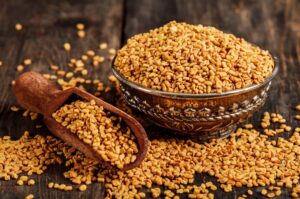Cinnamon: A Natural Wonder for Chronic Ailments

Cinnamon is a dried bark with a pleasant aroma, obtained from various species of the Cinnamomum genus, which are native to South Asia, South America, and the Caribbean.
Known for its unique sweet and spicy flavor, cinnamon is widely used as an ingredient in a variety of sweet and savory dishes enjoyed worldwide. In Europe and the United States, it is the second most commonly consumed spice, with black pepper taking the lead.
Cinnamon is available in both powdered and whole forms. Additionally, you can find cinnamon supplements and essential oils on the market. There are two main types of cinnamon:
Although both types of cinnamon are harvested and processed in a similar manner, they yield different characteristics and flavors.
Beyond its culinary applications, cinnamon has garnered attention for its potential health benefits, making it a fascinating subject of scientific research.
In this article, we will explore the nutritional profile of cinnamon and delve into its wide range of health benefits. From brain health to anti-inflammatory effects, cinnamon has demonstrated promising properties that can support overall well-being.
Nutritional Profile of Cinnamon
Cinnamon is not only a flavorful spice but also a source of various essential nutrients. While it is typically consumed in small amounts, its nutritional composition adds to its appeal. Here are some key nutrients found in cinnamon:
It’s important to note that the nutritional content of cinnamon may vary slightly depending on the variety.
Health Benefits of Cinnamon
Cinnamon has long been valued not only for its delightful taste and aroma but also for its potential health-promoting properties. Here are some of the key health benefits associated with cinnamon:
1. Potential Benefits for Brain Health
Some research suggests that cinnamon may have neuroprotective properties and could potentially help improve cognitive function and memory.
Indeed, Cinnamon plays a significant role in preventing Alzheimer’s Disease (AD), a neurodegenerative condition characterized by memory loss, confusion, language difficulties, and impaired judgment. AD is often associated with the accumulation of amyloid-beta (AB) polypeptide in the brain.
Numerous animal studies have been conducted, demonstrating that the cinnamon extract found in cinnamon bark can prevent the formation of AB plaques, thus inhibiting the progression of AD. These studies also revealed improved cognitive function and reasoning in the mice involved. In fact, one study even demonstrated a reduction in AB plaques in mice with AD, suggesting that cinnamon may have a therapeutic effect in managing the disease.
2. Anti-Cancer Properties
Cinnamon contains various bioactive compounds, including cinnamaldehyde, which has been studied for its potential anti-cancer effects.
Indeed, Cinnamon has shown potential in combating various types of cancers such as lung, breast, cervical, and throat cancer, among others.
In a study involving mice with colon cancer, cinnamon was found to inhibit the growth of cancer cells by activating detoxifying enzymes. Additionally, it hindered the formation of blood vessels in the tumor-affected area, thus preventing its spread.
3. Regulates Blood Sugar Levels
Diabetes, a chronic condition arising from insufficient insulin production, disrupts the body’s ability to effectively utilize absorbed sugar from food, leading to elevated blood sugar levels and potential damage to internal organs. With increased risks of heart disease, vision problems, kidney disorders, nerve ailments, and other serious health complications, managing diabetes is crucial.
Fortunately, the remarkable effectiveness of cinnamon in treating diabetes has been substantiated by numerous human studies worldwide. Cinnamon contains polyphenolic compounds that aid in regulating impaired fasting glucose (IFG). By interfering with digestive enzymes, cinnamon slows down carbohydrate digestion, reducing the amount of sugar released into the bloodstream. This serves as a valuable substitute for insulin deficiency, as it helps maintain lower sugar levels.
Moreover, cinnamon addresses insulin resistance, facilitating the entry of necessary carbohydrates into cells for proper bodily function. A specific component of cinnamon, Methyl Hydroxy Chalcone Polymer (MHCP), acts as an insulin mimetic when insulin is lacking, easily entering cells to fulfill carbohydrate requirements. Although its glucose consumption benefits are slightly slower compared to insulin, it remains highly effective.
Additionally, cinnamon mitigates Oxidative Stress, a crucial factor in preventing severe diabetic conditions. Oxidative stress arises from the imbalance between antioxidants and free radicals, leading to various cardiovascular and microvascular diseases. Thus, by maintaining stable blood sugar levels, cinnamon offers protection against a range of associated diseases.
4. HIV Treatment: A Promising Avenue for Immune Support
Human Immunodeficiency Virus (HIV) remains a global health concern, with over 690,000 deaths attributed to HIV-related complications in 2019 alone. HIV gradually weakens the immune system and, if left untreated, can progress to more severe diseases such as AIDS.
In the quest for effective HIV treatments, cinnamon has emerged as a noteworthy contender. Specifically, cinnamon has shown efficacy in combating HIV-1, the most prevalent strain-affecting humans today. In a laboratory experiment comparing the effectiveness of 69 plant species in treating HIV, cinnamon stood out as the most potent option.
While these findings provide encouraging insights, further research is required to establish a controlled environment for practical testing on humans.
5. A Natural Alternative to Combat Bacterial Infections
Cinnamon possesses antimicrobial properties that may help fight against various bacterial strains. It has been studied for its potential role in combating common bacteria, including Salmonella and E. coli. Incorporating cinnamon into your diet may offer a natural approach to support your immune system.
In 2011, a groundbreaking test-tube study shed light on the remarkable antibacterial properties of cinnamon extracts and essential oils. The study employed a combination of cinnamon extract and organic solvents to assess its effectiveness against various strains of bacteria. The researchers observed a significant inhibition zone spanning 7-18mm, highlighting the potent antibacterial effect of cinnamon.
Further experiments demonstrated the exceptional performance of cinnamon extract against two clinical strains, positioning it as a highly viable alternative to traditional antibacterial compounds. Unlike synthetic antibacterial medicines, which bacteria can develop resistance to over time, cinnamon’s components exhibit an innate ability to defy resistance. This unique characteristic empowers cinnamon as a long-term solution for combating bacterial infections, mitigating the issue of bacterial resistance that has posed a grave threat to global health.
6. Supports Heart Health
Cardiac diseases often lurk silently, claiming lives without warning. However, emerging research has uncovered the remarkable benefits of cinnamon in reducing the risk of such life-threatening conditions.
The simple addition of a teaspoon of cinnamon to your daily routine can work wonders in maintaining a healthy cardiovascular system. Cinnamon proves effective in regulating blood sugar levels and combating diabetes, a leading contributor to heart diseases. Additionally, it aids in reducing cholesterol levels, targeting both the “bad” cholesterol while preserving the “good” one.
Animal studies have further unveiled cinnamon’s potential in lowering blood pressure, a significant factor in cardiac diseases. By addressing these pivotal risk factors, cinnamon acts as a formidable guardian of heart health, significantly diminishing the likelihood of developing these detrimental conditions.
Embracing this simple yet potent remedy empowers individuals to take proactive steps towards safeguarding their heart health.
7. A Natural Ally in the Battle Against Obesity
In the fight against obesity, researchers at the University of Michigan have uncovered a powerful weapon: cinnamon essential oil. Intrigued by cinnamon’s ability to enhance metabolic activities, they delved deeper into its potential for fat burning.
Their findings revealed that cinnamaldehyde, a key component of cinnamon, ignites thermogenesis—a process that generates heat and energy by burning calories. This metabolic boost sets the stage for effective weight loss. By harnessing the power of cinnamon, individuals can tap into a natural aid in their journey towards shedding excess pounds.

8. A Promising Aid in the Battle Against Multiple Sclerosis
Multiple Sclerosis (MS) poses a significant challenge as a chronic and progressive disease affecting the central nervous system, leading to nerve damage in the brain and spinal cord. Patients grappling with MS experience a range of debilitating symptoms, including impaired speech, persistent numbness, loss of coordination, extreme fatigue, and compromised vision.
Fortunately, recent animal studies have shed light on cinnamon’s potential role in the treatment of MS. In one such study, mice were administered cinnamon and water before undergoing tests, revealing the spice’s anti-inflammatory properties on the central nervous system.
Moreover, researchers have discovered that cinnamon acts as a protective agent for Tregs, which play a crucial role in the immune system. Tregs serve to regulate the body’s immune response to internal and external particles (antigens), thus preventing autoimmune disorders.
Given the close relationship between MS and Tregs, with individuals suffering from MS experiencing reduced T cell counts, a mouse study demonstrated that cinnamon safeguards the constituent proteins of Tregs. Consequently, cinnamon acts directly and indirectly to reduce the likelihood of developing MS.
9. A Potential Solution for Chronic Wounds
Chronic wounds present a unique challenge as they are resistant to conventional treatments and often require an extended healing period. However, researchers have made a significant breakthrough by developing a method to extract and encapsulate the antimicrobial properties of cinnamon and peppermint. These innovative capsules have shown promise in effectively treating wounds and combating bacteria, making cinnamon a potential solution for chronically infected wounds.
The process involves carefully extracting and packaging the beneficial components of cinnamon and peppermint, harnessing their antimicrobial properties. These capsules offer a targeted approach to wound treatment, providing sustained release of the therapeutic compounds.
10. Anti-inflammatory Effects
Cinnamon contains compounds that possess anti-inflammatory properties. Chronic inflammation is linked to various health conditions, including heart disease, diabetes, and certain types of cancer. Incorporating cinnamon into your diet may help reduce inflammation and contribute to overall health.
Remember that while cinnamon shows promise in these areas, it is not a substitute for medical treatment. It is always advisable to consult with a healthcare professional for personalized advice.
Next, we’ll explore creative ways to use cinnamon in cooking and baking.
Precautions and Potential Interactions with Medications
While cinnamon offers numerous health benefits, it’s essential to exercise caution, especially if you are considering using cinnamon supplements or consuming it in large quantities. Here are some precautions and potential interactions with medications to be aware of:
It’s important to remember that while cinnamon has health benefits, it is not a replacement for medical treatment or medication prescribed by healthcare professionals. If you have any underlying health conditions or are taking medications, always consult your healthcare provider before incorporating cinnamon supplements into your routine.
Takeaway
Cinnamon emerges as a remarkable solution for various chronic diseases, showcasing its effectiveness as a natural remedy. With its potent anti-inflammatory and antibacterial properties, cinnamon assumes a vital role as an essential component of everyday cuisine.
This extraordinary spice not only combats the growth of cancer cells and aids in the treatment of chronic wounds but also serves as a valuable ally in reducing the risk of cardiac diseases. Additionally, cinnamon has proven effective in managing conditions like multiple sclerosis (MS) and Alzheimer’s disease.
Notably, cinnamon exhibits promising potential in preventing HIV transmission and promoting weight loss through its fat-burning properties.






